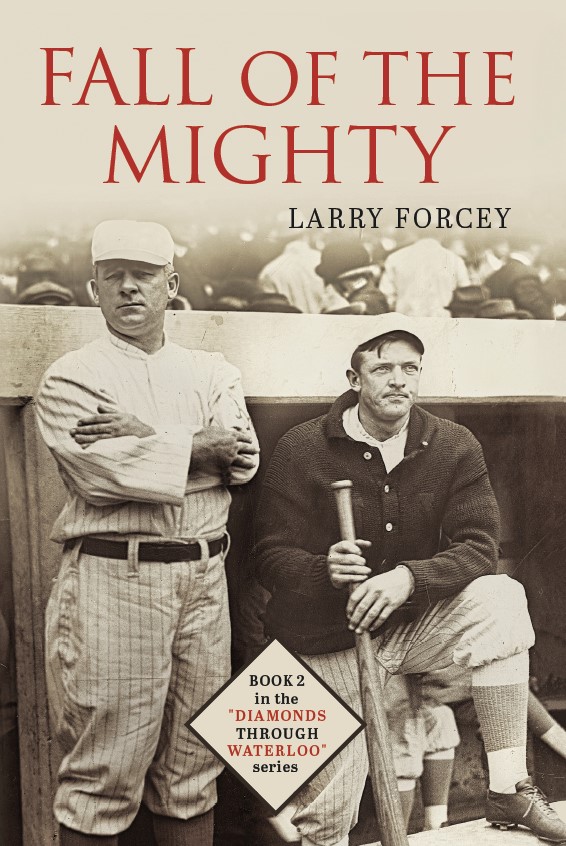With the death of the compassionate Sir Thomas, young William is on his own again. Though he could remain amongst the other boys at St. Mary’s, or endure the lifelong drudgery of factory work, William is compelled to seek more. He sets out to meet Sir Thomas’s friends and companions, and to make something of himself in the world—all while keeping a sharp eye on developments in baseball’s early “dead-ball” era.
Unapologetic about its interests, Larry Forcey’s FALL OF THE MIGHTY is a curious ground-level view of early 20th-century America. William is an urban orphan, already entering the workforce at 11, and one could imagine a more emotionally affected narrative of this story, dripping with pathos and evoking Riis’s How the Other Half Lives. But instead, FALL OF THE MIGHTY takes an almost modernist approach: William prefers to think about baseball, not the material conditions of his own existence, so the text does the same. Unfortunately, this isn’t the most effective way to tell this story. The end matter notes that the stats and numbers of players and games were drawn from contemporary reporting in local newspapers, so there is a grounded historical interest in the game and how it was played. However, this reportage takes up a sizeable proportion of the text, and an unprepared reader might be taken aback by it. If there’s some type of metaphorical or structural relationship between the vicissitudes of a given baseball season and William’s personal journey, it’s lost in the sheer volume of dutifully recited statistics. In its worst moments, the baseball matter seems outright intrusive: during a crucial moment when William is learning precious new information about his previously unknown mother, the text interrupts itself to note, “By the second inning of game seven, the Pirates were leading, 2–0. At the end of the fourth, the score was 4–0. After six, it was 7–0. After eight, the score was 8–0.”
For all its attention to the quantitative particulars of real baseball games, or name-dropping particular celebrity players of the early 20th century, FALL OF THE MIGHTY is surprisingly thin on historic detail. Both everyday life and baseball itself were materially different than they are today, but the text is mute on textures like the construction of old-style baseball stadiums, or the feel of old-style baseballs (which had a different core than a modern baseball and were often played to the point of unravelling), which might be more interesting to a general reader of historical fiction. William’s life is also quite mobile, but with almost no scenic detail; New York City is as undifferentiable from Boston as it is from Scranton, PA. Again, there’s something approaching modernism in this strategy—William only cares about the interiors of ballparks, so the narrative does the same—but whether or not this is intentional, it still doesn’t feel like it enhances the storytelling or reading experience.
Though highlighting some particulars of a vivid moment in American social history, FALL OF THE MIGHTY isn’t appreciably more effective at evoking its subject matter than the popular nonfiction accounts from which it draws.
Thoroughly well-researched and carefully crafted, Larry Forcey’s FALL OF THE MIGHTY still doesn’t successfully braid its narrative threads into an emotionally compelling story.
~Dan Accardi for IndieReader

